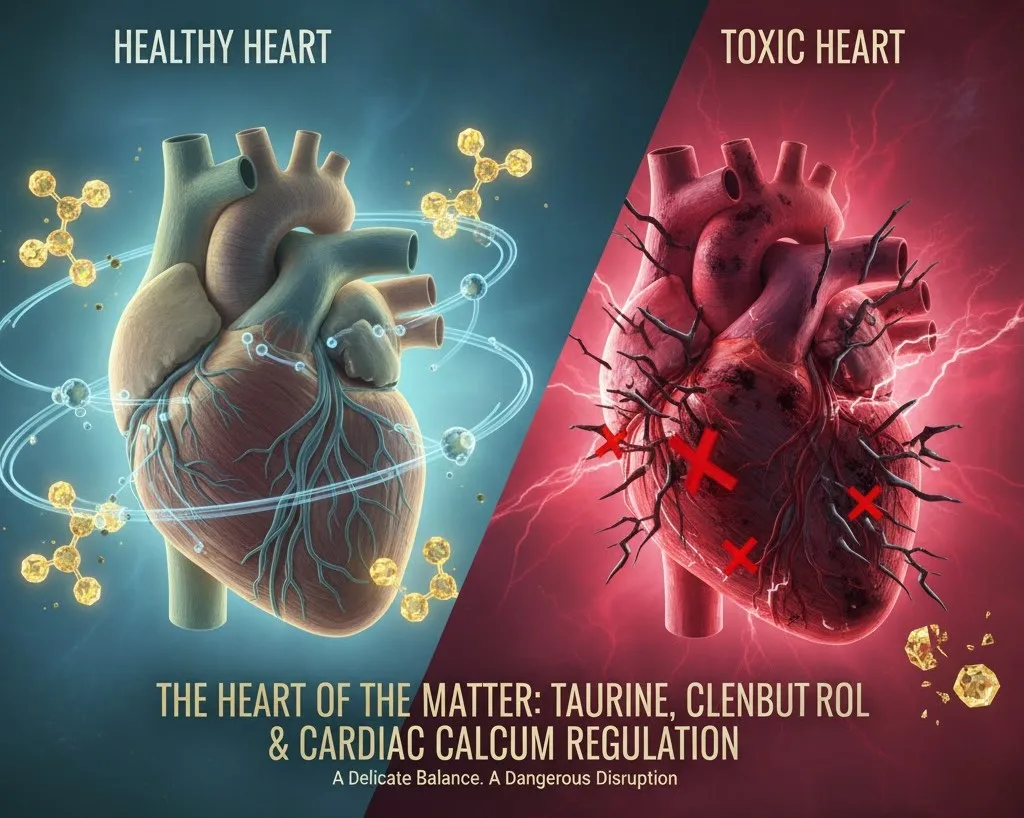In the intricate world of human physiology, the heart stands as a tireless pump, its rhythm and strength dictated by a delicate balance of electrolytes, proteins, and amino acids. Among these vital components, taurine and calcium (Ca2+) play critical roles in maintaining cardiac health. However, the introduction of potent drugs like clenbuterol, often misused for performance enhancement, can dramatically disrupt this balance, leading to severe consequences for the cardiovascular system.
Taurine: The Heart's Unsung Protector
Taurine is a fascinating and abundant amino acid, not used in protein synthesis, but vital for numerous physiological processes, particularly within the heart. Its cardioprotective reputation stems from several key functions:
-
Calcium Homeostasis: Taurine is a primary modulator of Ca2+ within cardiac muscle cells. Ca2+ is the essential trigger for heart muscle contraction. Taurine helps ensure that Ca2+ levels are precisely regulated, facilitating efficient contraction and relaxation. It can influence both the influx of Ca2+ into the cell and its storage within the sarcoplasmic reticulum (SR), the cell's internal Ca2+ reservoir.
-
Antioxidant Power: The heart is constantly working and thus prone to oxidative stress. Taurine acts as a potent antioxidant, neutralizing harmful free radicals that can damage heart cells and impair function.
-
Osmoregulation: Maintaining proper fluid balance within heart cells is crucial for their structural integrity and function. Taurine contributes to osmoregulation, preventing cells from swelling or shrinking excessively.
-
Membrane Stabilization: It helps stabilize cell membranes, making them more resistant to damage and ensuring proper electrical signaling within the heart.
The net effect of taurine is a healthier, more resilient heart, capable of maintaining its critical pumping function. Studies have shown that adequate taurine levels are associated with improved cardiac function and protection against various forms of heart disease.
Clenbuterol: A Dangerous Double-Edged Sword
Clenbuterol is a synthetic sympathomimetic amine, originally developed as a bronchodilator for respiratory conditions. However, its potent β2-adrenergic agonist properties also lead to anabolic and lipolytic (fat-burning) effects. This has unfortunately made it a drug of choice for some athletes and bodybuilders seeking rapid muscle growth and fat loss, despite its classification as a banned substance and its serious health risks.
The cardiovascular system is particularly vulnerable to clenbuterol's effects:
-
Cardiac Hypertrophy: Chronic clenbuterol use can lead to pathological cardiac hypertrophy, an abnormal enlargement of the heart muscle that impairs its ability to pump blood effectively.
-
Arrhythmias: It can induce tachycardia (rapid heart rate) and increase the risk of dangerous cardiac arrhythmias, including ventricular fibrillation, a life-threatening electrical disturbance.
-
Direct Myocardial Injury: Research indicates that clenbuterol can cause direct damage and necrosis (cell death) of heart muscle cells, contributing to reduced cardiac function and potential heart failure.
-
Disrupted Calcium Handling: A critical mechanism of clenbuterol's cardiotoxicity involves its disruption of Ca2+ homeostasis. It can impair the delicate Ca2+ signaling necessary for proper excitation-contraction coupling, weakening the heart's ability to contract.
The Perilous Interaction: Clenbuterol and Taurine Depletion
A significant concern regarding clenbuterol's cardiotoxicity lies in its potential to deplete endogenous taurine levels within the heart. If clenbuterol reduces the heart's natural supply of taurine, it effectively strips away a crucial protective mechanism. This depletion can:
-
Exacerbate Ca2+ Dysregulation: Without sufficient taurine, the heart's ability to manage Ca2+ becomes compromised, making it more susceptible to the damaging effects of clenbuterol.
-
Increase Oxidative Stress: Reduced taurine means less antioxidant defense, leaving heart cells more vulnerable to oxidative damage.
-
Heighten Risk of Myocardial Injury: The combined assault of clenbuterol's direct toxicity and the loss of taurine's protective effects creates a dangerous environment for heart muscle cells, increasing the likelihood of injury and dysfunction.
Paradoxically, some individuals who misuse clenbuterol attempt to counteract its adverse effects by supplementing with taurine. While taurine itself has cardioprotective properties, its use in conjunction with clenbuterol may not mitigate the risks and could even be problematic in certain contexts, particularly if underlying cardiac vulnerabilities exist. There have been documented cases where the combined use of these substances was linked to severe adverse cardiac events, underscoring the unpredictable and dangerous nature of this interaction.
Conclusion
Taurine is an essential amino acid that plays a vital role in maintaining cardiac health, largely through its meticulous regulation of intracellular Ca2+ and its antioxidant properties. In stark contrast, clenbuterol, a drug frequently misused for its performance-enhancing effects, poses a significant threat to the cardiovascular system. Its cardiotoxic actions, including the disruption of Ca2+ handling and potential depletion of taurine, underscore the critical importance of avoiding its unauthorized use. The heart's delicate balance is easily tipped, and understanding the roles of compounds like taurine and the dangers of substances like clenbuterol is paramount for safeguarding cardiac health.

